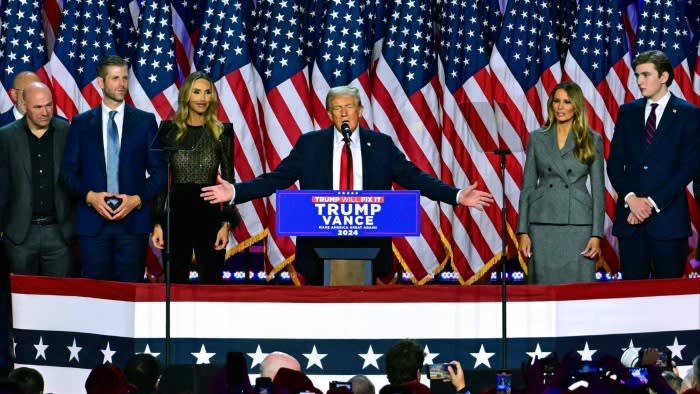Unlock the White House Watch newsletter for free
Your guide to what the 2024 US election means for Washington and the world
America has spoken — and emphatically. The history of its democracy is studded with “hinge” elections where voters decisively repudiate the philosophy and record of the outgoing administration and opt for something new. Every now and then, however, there is a result that goes far further and presages inordinate and tumultuous consequences not just for the nation but the world. The 2024 presidential election is one of these.
In voting Donald Trump back into the White House the electorate appears to have concluded that his record as a convicted felon, his unpredictability and his reputation for disdaining the norms of democracy matter less to them than his crisp “America First” prescriptions on the economy, national security and the world. Many of his policies may sound glib, hubristic if not foolhardy to his opponents. Indeed many of them are.
Yet unlike in his first term when Trump took office without a clear plan and was hemmed in by seasoned public servants, this time he knows exactly what he wants to do. He will also be flanked by true believers. For the global economy, America’s allies and the post-1945 international order, this poses huge risks — and, possibly, a calamity.
It is an extraordinary resurrection which speaks to a broader fraying of the appeal of liberal democratic values across the western world. The Democrats will rue their campaign and Kamala Harris’s failure to cut through. But Trump’s victory also points to an overall malaise, to the over-reach of the left’s progressive agenda, and to voters’ questioning the very purpose of democracy if it fails to deliver for them. Europe’s centrist leaders would do well to consider these sentiments as they too face off against the populist right.
What is in no doubt is that Trump will bestride Washington as a colossus. For months the world has been transfixed by opinion polls suggesting the race was too close to call. Yet the so-called 50-50 nation broke decisively for Trump. He gained ground on the Democrats in 48 of the 50 states in the union. The Republicans may end up controlling both houses of Congress and the White House. This will give Trump far more latitude than in his first term. He will benefit, too, from a sympathetic Supreme Court. Fears of a lurch to American autocracy may be alarmist, but the temptation for him to abuse his power will be acute.
So how to prepare for the return of “Make America Great Again” populism to the seat of world power? At home, Trump’s demoralised opponents will have to do battle in the courts if he tries to force through his more draconian proposed policies. The two most egregious are the threatened mass deportation of illegal immigrants, and a purge of government agencies. America’s institutions emerged intact — just — from Trump’s first term. This time, they will be even more sternly tested.
Trump’s Wall Street backers also face a test. They should not overlook the darker side of his agenda. Beyond the short-term enticement of his proposed tax cuts, they should consider the long-term inflationary implications of his threatened fresh wave of tariffs and the potentially cataclysmic consequences of a trade war. Trump is obsessed not just with raising tariffs on America’s strategic competitor, China, but also penalising countries that have a trade surplus with America.
FT Edit
This article was featured in FT Edit, a daily selection of eight stories to inform, inspire and delight, free to read for 30 days. Explore FT Edit here ➼
For America’s allies, there are difficult days ahead. It has long been clear that Americans are tiring of their post-1945 role in policing the world. But it will be far harder now for America’s allies to anticipate the stance of their traditional security guarantor. Trump promises to be quixotic and transactional. The networks of alliances that Joe Biden continued to nurture are less important to him than bilateral ties. Knowing this, east Asian and European allies will court him individually. But the regional alliances, not least Nato, have to be sustained. If not, the winners will surely be Russia and China. Also, a waning of the US-led alliance networks could lead to nuclear proliferation as states long under the American umbrella might deem it prudent to look to their long-term defence.
This election throws so much into the air — and Trump likes it that way. For Ukraine, the uncertainties are especially acute. Trump has insisted he will end the war, but this would surely be on Moscow’s terms. The great fear for Kyiv and Nato is that Trump strikes an overhasty deal that leaves Ukraine without security guarantees and splits Europe. Taiwan, too, will be uneasy given Trump has mused openly over whether America should defend it against China — though his aides suggest this is mere strategic ambiguity. In the Middle East, Trump claims he will bring peace but has not defined what that means, and whether it involves deploying American power alongside Israel and against Iran.
Much will depend on who Trump picks for the big national security roles. But whoever he chooses, it is clear that for the next four years at least the nature of US leadership will change. Multilateral bodies will be disdained, and multilateral treaties all but discarded. Such an approach threatens dire consequences for the green energy transition and efforts to combat global warming.
One possible silver lining to Trump’s vaunted unpredictability is that it will keep autocrats in Moscow and Beijing guessing too. But his election will also have given succour to authoritarian leaders around the world, many of whom he openly admires. The US may be an imperfect world leader. But there have always been certainties about its leadership, regardless of which party occupies the White House. Sadly, as the Trump world order takes shape, those certainties will be no more.
Source link









